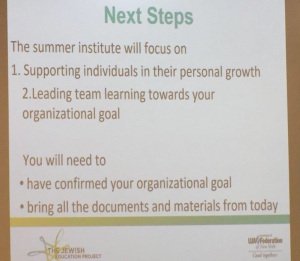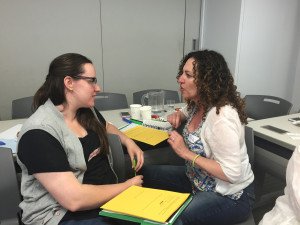Leading for Change: Looking ahead at Year 2 in Project LEAD
In my first post about Project LEAD, I gave a glimpse of how the participating educators reflected on their efforts to bring forward thinking ideas and conversations into their schools with their staff in June 2016. They shared stories of success with one another using artifacts from the past year and also articulated the challenges they saw still ahead of them in trying to create systemic change as leaders of their centers.
Now we get a little more insight into this transition from Year 1 to Year 2 for Project LEAD through an interview conducted with project director, Bryna Leider.
Can you describe what you hope participants will gain from Project LEAD this year?
I hope they become increasingly confident leaders of learning—adept observers, inspirational visionaries, guides of growth. Leading a change effort is very challenging, but I hope they persist in ways that honor their school communities and model the change they seek in the classrooms.
The concluding seminar held in June reintroduced the topic of goal-setting for the directors and teacher leaders. Can you share why this was the direction you chose to move into?
Last year, we asked the coaches to meet with each leadership team and co-create goals for the year. We wanted schools to have autonomy in the goal-setting, but as the year progressed, we realized that there were common challenges surfacing that everyone might be willing to work towards. If we could collectively determine some goals, we might better help each other as we work towards them.
Additionally, most of the schools had set goals in a number of focus areas. This is a legitimate change strategy (and very natural when one is eager to realize a vision), but in choosing breadth over depth, you often sacrifice a deeper understanding of the “why” behind the change. It felt important to give schools permission to narrow their goals so that they might ultimately get further in the future.

Now that the goals have been narrowed, how is each leadership team preparing to use them in their schools to influence change?
The leadership teams participated in a two day summer institute with Betsy McKenna, Exponential Returns, LLC, that focused on designing professional development that models Reggio practices. We explored how to set up supervisory meetings that are tailored to the interests of staff members, but still connect to where the organization is seeking to go. We practiced observing, documenting and providing feedback, which are core to the Reggio philosophy.
On the second day, we thought about the design of team learning. We discussed ways to build community and respect for the group and created sample agendas for opening meetings that would reflect the enhanced staff cultures we are seeking to cultivate. Our goal is for these new processes to be included in the planning that directors typically engage in over the summer and become part of an expanded professional development schedule in the new school year.

What has been a big "aha" for you about the challenges directors face when moving into the role of change agents in their school?
I am fully aware that time is one of the biggest challenges schools face, but the real “aha” was the extent to which the challenge correlated to time spent on professional development.
Change requires an enormous amount of learning—learning that can’t take place by one’s self after hours. We realized together that carving out more time for teacher learning was essential. This was deeply complicated, but I am so gratified that they figured out how to make it work. Our next challenge is to make sure that the time is used effectively, in a way that has a positive impact on students. This seems straight forward, but it’s not. The research on PD demonstrates that most of it has a minimal impact on students. But it’s possible and that’s where we are heading.
What do you appreciate most about this cohort of Project LEAD participants?
They are so open and honest! The group consists of directors, assistant directors and teachers. I expected some hesitancy about giving honest feedback, but participants have been deeply reflective and up front about everything!
To learn more about Project LEAD, contact Bryna Leider, at bleider@JewishEdProject.org
Shariee Calderone is Sr. Education Consultant for Early Childhood and Family Engagement at The Jewish Education Project.